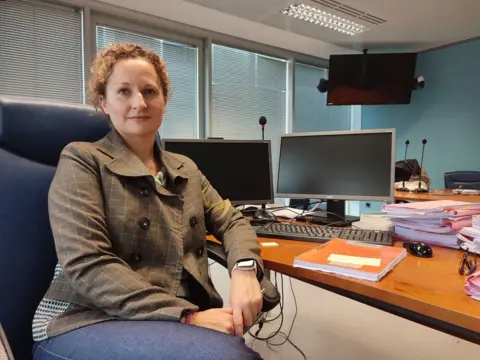A Unique Tea Shop in West Bengal: Where Customers Become Caretakers

In the bustling Chatra neighborhood of Serampore, approximately 30 kilometers (19 miles) from Kolkata, lies a quaint tea shop known as Naresh Shomes tea shop, a local gem steeped in history. This humble establishment, just five-by-seven feet in size, is not only famous for its aromatic tea but also for its unique practice of allowing customers to take over the operations when the owner is away.
On a warm March morning, 65-year-old Ashish Bandopadhyay cycled to the tea shop with enthusiasm, ready to volunteer for the day. Dressed casually in a pastel pink polo shirt, Ashish declared, Its my turn today. With a smile, he explained, I dont work here; Im just an old-timer and a customer who loves volunteering. His statement reflects the deep-rooted social values that this tea shop embodies, as it is a place where community bonds are forged over steaming cups of cha, the Bengali term for tea.
The shop has been a cornerstone of relaxation, conversation, and connection for nearly a century, known locally as Naresh Shomes cha er dokaan. Ashish, who has frequented this tea shop since he was 10 years old, appreciates it not only for the tea but also for the friendships he has cultivated there. Every weekday morning, Ashok Chakroborty, the 60-year-old owner, opens the shop before leaving for his office job. A cooperative spirit prevails, as regular customers like Ashish step in to run the shop until he returns in the evening.
Today was my turn, Ashish noted proudly, explaining that there are 10 volunteersmostly retired individuals receiving pensionswho take turns running the shop throughout the week, ensuring it remains operational every single day. Theres no set schedule; its simply whoever is available takes charge, he explained. The shops cash is kept in a wooden box, and remarkably, there hasn't been a single day without someone to look after it.
Naresh Shome, the shops founder, opened this establishment around 1925 on the ground floor of his aunts building. Initially a gathering place for locals to enjoy their brews, the shop has preserved its historical essence, with only minor renovations over the years. The only changes are a few coats of paint and a ceiling repair, Ashish observed. The walls, still marked by soot and smoke from the traditional coal-fired clay stove, add to the shops charm. Tea is served in both clay and paper cups, with a refill priced affordably at just five rupees (approximately $0.06).
The tea shop offers a modest menu featuring milk teaavailable with or without sugarand black tea served either plain or with lemon, alongside Kobiraji cha, which is infused with spices. To complement the tea, jars of biscuits are always on hand. Located near Chatra Kali Babus Crematorium, the shop witnesses many family members stopping by for a cup of tea after saying their final goodbyes to departed loved ones.
Shome, a former employee of Brooke Bond, a tea company dating back to the colonial era, left his corporate life to fight for India's independence. After India gained freedom from British rule in 1947, he became an active member of the Communist Party of India (Marxist) until his passing in 1995. His legacy continues through the tea shop, which has served as a meeting point for comrades to discuss ideas over cups of tea.
This tradition remains alive today, as evidenced by regular customer Prashanto Mondal, who recalls being introduced to the shop 25 years ago during a lunch break. There are many tea stalls in Serampore, but I continue to come here almost daily for its unique atmosphere and camaraderie, he said. Like many others, Prashanto willingly helps Ashish with tasks such as refilling the coal in the oven or fetching milk from nearby shops. We often hear stories about Naresh Shomes days as an activist, Ashish added. His spirit of community service has endured, and its evident that the customers naturally take on the responsibility of the shop in the owner's absence.
Naresh Shomes tea shop stands as a testament to the cultural fabric of Serampore, a town rich in history that predates Kolkata by centuries. Once ruled by both the Danes and the British, Serampore was a Danish trading hub known as Frederiksnagore from 1755 until British rule began in the mid-19th century. The town's vibrant heritage is reflected in its streets, where horse-drawn carriages once transported European officers but now give way to the hustle and bustle of motorcycles and electric rickshaws.
Local restoration activist Mohit Ranadip emphasized the shop's importance in preserving the cultural traditions of Serampore. Adda and para culture remain significant in our locality, and perhaps thats why this tea shop continues to thrive, he noted. In West Bengal, para culture represents a neighborhood ethos defined by strong community ties, where tea shops often serve as informal meeting spots for lively discussions and exchangesknown as addaover cups of tea.
As evening approaches, Ashok returns from his clerical job, ready to take over from Ashish. Today, Ashish da gave me 400 rupees ($4.65) from the days income, Ashok mentioned, pouring tea into clay cups for the remaining customers. He proudly reported that they sell around 200 cups on a typical day and has never faced issues with customers failing to pay, as they invariably leave the correct amount in the cash box or return later to settle their bills.
However, both Ashok and Ranadip express concern over the future of this cherished establishment. Im worried whether the younger generation will embrace this legacy of trust, Ashok admitted, citing the apparent decline in younger patrons partaking in the tea shop culture. His own son, now an engineer, has shown little interest in continuing the family tradition.
Ranadip echoed these concerns, stating, Todays youth are so preoccupied with their lives that they hardly have time for adda, which raises questions about the future of shops like this one. Despite these uncertainties, Ashok remains hopeful that the community will come together to preserve the tea shops legacy. I choose to stay optimistic that our beloved shop will continue its tradition for many more years to come, he concluded, showcasing the resilient spirit that has defined Naresh Shomes tea shop for generations.



























